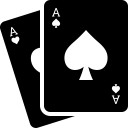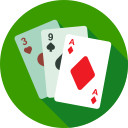
To be specific, slots often have a house advantage of anywhere from 3% to 12%, meanwhile roulette has 2.7%, craps has 1.4% and baccarat has 1.06%. Even better, you can find plenty of blackjack games with a house advantage of less than 1% when played with optimal strategy. In fact, by combining perfect strategy with counting cards, you may even get an edge on the house at blackjack (although this is impossible to do at online since decks are “shuffled” after every hand).
-
Bonus: 100% up to $3,000.

- Best Online Casino for USA.
- Fastest payouts (7-10 days).
- Top-class casino software.
A Game of Decisions – How To Play Blackjack (And Win)
“Winning at blackjack requires two things: You must bet more when you have the advantage and less when the dealer has the advantage; and you must make correct decisions on insurance, surrender, splitting pairs, doubling down, and hitting or standing.”
Stanford Wong, Blackjack Secrets

But blackjack is a game of “dependent trials” in which you can track cards and the cards that were just dealt are now removed from the deck or shoe for the next hand — knowing this helps you to make educated decisions. What happened during the last deal influences your chances of winning during the next deal.
And that’s another point: blackjack is a game of decisions. The more room you have for decisions in gambling games, the less of an advantage the casino usually has suggesting you play the game with optimal strategy.
Optimal strategy in blackjack is called basic strategy. When you play blackjack with fair house rules, basic strategy can make the house edge almost non-existent or even give the player an advantage in some games. (According to Las Vegas Sun, basic strategy was invented all the way back in 1950s, by the way.)
Your expected win at blackjack consists of two components: how much you bet and how big your advantage is. As a card counter, you make money by maximizing your edge (by using basic strategy and card counting systems) and varying your bet sizes (bet less when the deck is bad and more when the deck is good).
Blackjack is different from most of the other casino games in that your chances of winning change constantly. Every card dealt changes them in some way, whereas with slot machines, for example, your odds of winning are the same for every spin.
How It All Started
1956 was a particularly important year for blackjack. While not the first book to have information on how to improve your chances of winning at blackjack, Baldwin et al’s piece in a scholarly statistics journal was the first one to present a legitimate way of optimizing your blackjack plays by using mathematical analysis (nowadays called “basic strategy”).
It took another 10 years for Edward O. Thorpe to publish Beat the Dealer – perhaps the most influential gambling book of all time. Thorpe was the first one to write about tracking the ratios of which types of cards have been dealt and which are still left in the deck or shoe. Just as importantly, Thorpe introduced the concept of varying your bet sizes based on how beneficial the deck or shoe is.
These two ideas form the basic foundation of card counting at blackjack even today.
Can You Beat Blackjack?
While the theory of beating a blackjack game is nowhere near to rocket science (knowing basic arithmetics will get you far), finding the right circumstances for winning and keeping that circumstance going is the true challenge. Live casinos offer less and less winnable games and online games are never winnable since you’ll get the equivalent of a shuffled deck for each hand (the more of a deck is dealt before shuffling, the more of a chance a card counter has to make profitable plays).
It’s hard to accept that advantage players are finding less and less opportunities nowadays. Learning how to play blackjack optimally still makes sense because you should always try to give yourself the best possible chances to win (and minimize losses at the same time). Finding true winning opportunities, however, happens rarely nowadays. You can still find them though by working hard.
Do Betting Systems Work?
Blackjack betting progression systems never give you an edge over the casino. The only “betting systems” that help you to win at blackjack are following basic strategy and using blackjack counting systems to determine what to do and how much to bet.

There are two kinds of gambling systems: ones in which you win often but when you lose, you lose big-time; and ones in which you lose often but when you win, you win big-time. Systems in which you bet more each time you lose are called “negative progression” betting systems; systems in which you bet more each time you win are called “positive progression” betting systems.
Regardless of the type, none of them give you an edge over the casino.
For entertainment purposes, I decided to write about some of the most popular systems for betting at blackjack.
The Martingale System
“If you want to maximize your chances of a net win, at the cost of a possible very large loss, then the best strategy is to bet more after losing, thus trying to recoup past losses. The Martingale is an example of a very aggressive form of this strategy.”
– Michael Shackleford, Wizard of Odds
Perhaps the most famous gambling betting system is called Martingale — I won’t go through every single betting system that I’m aware of because it would be largely a waste of time (again, they don’t work), but I will explain Martingale as an example.
The Martingale betting system is simple: you double your bet until you win. Surprisingly many gamblers consider Martingale a foolproof system for betting at blackjack. (They are wrong.) Martingale “works” until you fail to win and run out of money (use this system long enough and you will do that.)
Edward Packel points out two big problems with Martingale in his book The Mathematics of Games and Gambling:
- The player has only a finite amount of capital.
- The casino imposes a maximum on any given bet.
Gamblers who use Martingale brag about winning frequently and it’s likely that they do. You will certainly win over 50% of your sessions but some % of the time you will either run out of money or face the maximum bet cap, which means you lose everything.
Common Mistakes
You need to know what to do, but it’s also good to know what absolutely not to do in blackjack games (by avoiding the wrong things, you’ll more likely do the right things), so I decided to expose some of the common blackjack mistakes:
Taking Insurance
Casinos promote blackjack insurance side bets as something of a guarantee to make money with your current hand. Many players believe that it’s therefore a good idea to insure your strong hands — in reality, insurance is never a good option for the player and the worst time to take insurance is when you have a strong hand.
But why is it bad to take insurance on any blackjack hand?
First of all, insurance is a side bet and has no effect on the actual hand you’re playing. Regardless of the outcome of your insurance bet, the original hand will be played in a standard way. If you take insurance and the dealer has a natural blackjack, insurance pays 2:1; if the dealer doesn’t have a natural blackjack, you lose the insurance bet. (Remember: the original hand will be played in a standard way no matter what.)
Depending on the amount of decks in use and cards already dealt, the chances for the dealer to have a ten, jack, queen or king as the second card are about 4/13; obviously the card is anything but a ten value with a chance of 9/13. A simple expected value calculation tells us that you’ll lose about 1/13 of the bet size per insurance bet.
That’s about 7.7% loss per insurance bet.
And why is it worse to insure strong blackjack hands (even though insuring all kinds of hands is wrong in most cases)? Two examples: in example A your hand is 3,4 and the dealer’s upcard is ace, while in example B your hand is Q,K and the dealer’s upcard stays the same.
Many blackjack players would say that it’s better to insure the stronger hand (Q,K) — however, when you have two cards with a value of ten, the deck or shoe has two of those less and you get less benefit from insuring the hand since it’s less likely for the dealer to have a card with a value of ten.
So one of the common blackjack mistakes is to take insurance and even a bigger one is to take insurance on strong blackjack hands.
Not Hitting on Soft 16.
One of the most mind-boggling blackjack mistakes is to not hit on a soft 16 (means you have an ace in your hand which you can use as either a value of 11 or 1.)
You have nothing to lose!
The dealer must take more cards until the hand’s value is 17 or more — therefore it makes no difference if your hand is valued 16 or any other number under 17 since you’ll only beat the dealer in case the dealer busts. So you might as well hit on the soft 16 and try to make it a value of 17 or higher (while keeping it under 21, of course).
Deviating from Basic Strategy
It’s rarely advisable to deviate from basic strategy and the only expection could be when you’re making a cover play (see blackjack tips), although even that is questionable, since casinos look for card counters, not those who play according to basic strategy.
Sometimes the dealer might suggest a play that differs from what basic strategy tells you to do — this is because the dealer knows no better. It’s surprising how rarely dealers are familiar with basic strategy or card counting but still feel the need to “teach” customers to play blackjack.
Using Betting Progression Systems
Martingale, Fibonacci, Labouchere… you name it. There’s zero evidence that any betting progression system works and, in fact, all the evidence against them working.
Smart card counters bet small when the deck is bad and big when the deck is good. There’s no other sensible betting system for blackjack since you really just want to to sacrifice the minimum amount of money when the deck is bad and the maximum amount of money when the deck is good.
Act Based on Superstitions, Riding the Wave, etc.
Smart gamblers always choose the option that has the highest expected value — in other words, you find out your best move by comparing each actions’ expected value and then you choose the one with the highest EV.
Never rely on your instincts, superstitions or “riding the wave.”